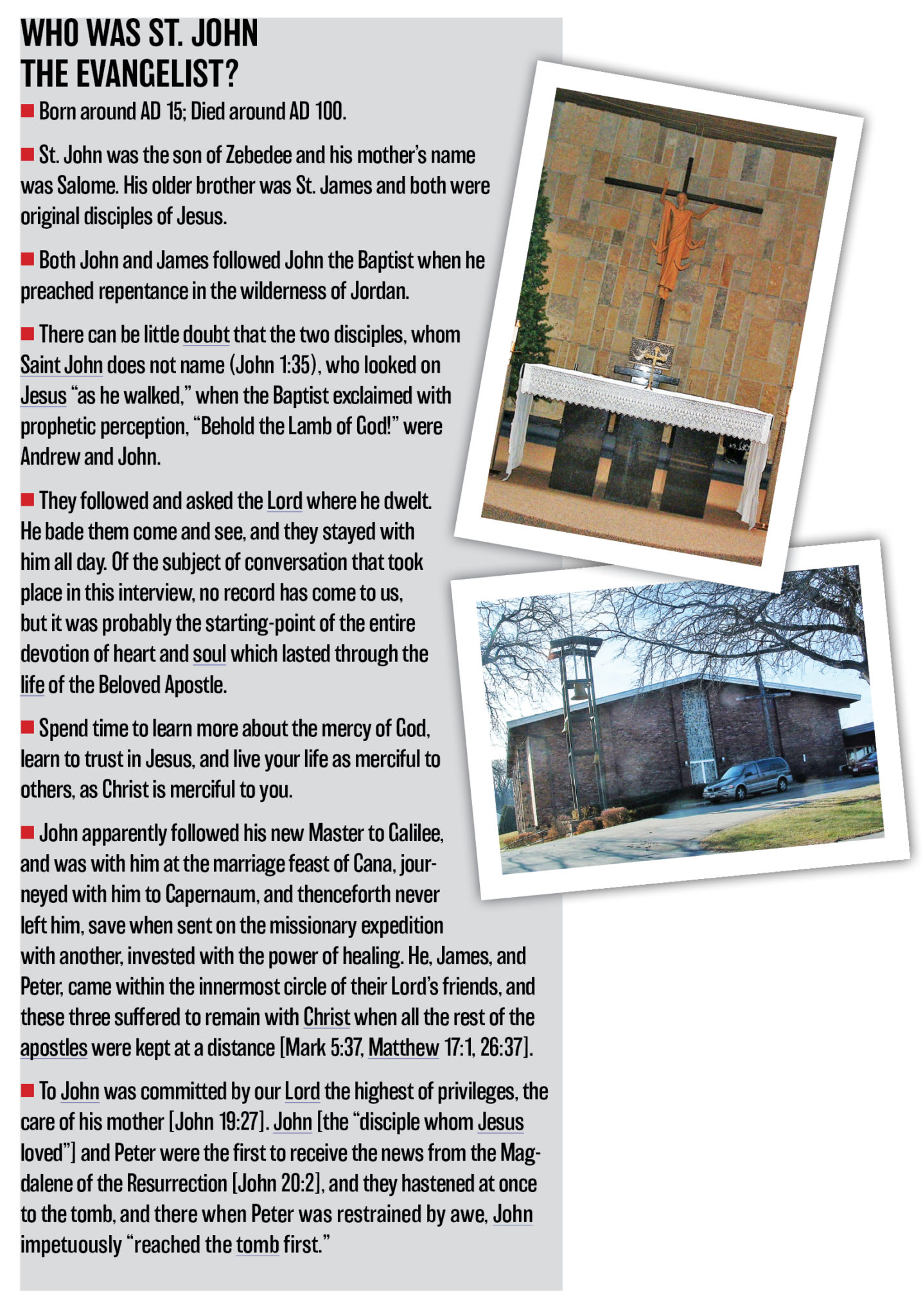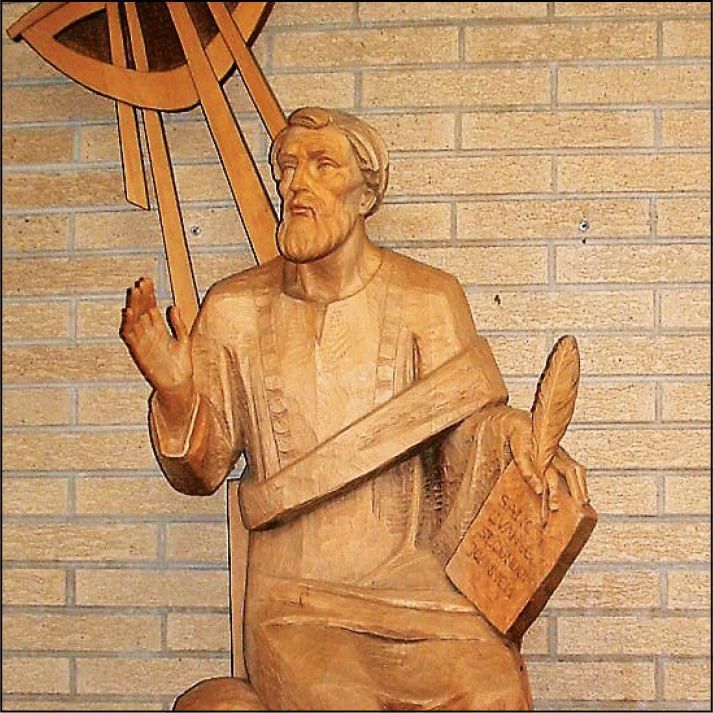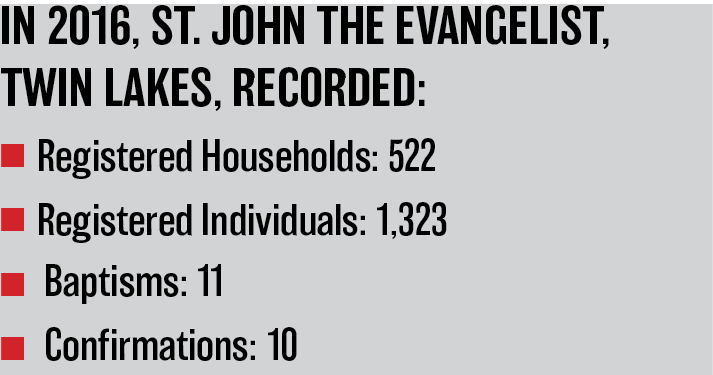
The cross outside St. John the Evangelist in Twin Lakes. Top: The altar at St. John the Evangelist. Above: The entrance to the parish. (Photos by Tom Andrews)
Between them, Adam Younker and Kevin Fitzgerald have more than 100 years of experience as parishioners at St. John the Evangelist Parish in Twin Lakes. Younker has attended this church for 55 years and Fitzgerald about 52. They jokingly refer to themselves as “lifers” and each has happy memories at St. John’s going back to their childhoods when the original St. John’s was located on the other side of town on Legion Drive.
“I come from a family of seven and this was just a comfortable place,” Fitzgerald recalls. “My memories of that were that the church was overflowing. We’d have church in the basement and upstairs at the same time. Then, in 1970, the current church was built. I have a lot of good memories seeing it built. We even used to keep our go-karts up here as kids because the street didn’t go through and made for a great lap for the go-karts.”
The construction of the present St. John’s church building also brings back special memories for Younker because his father, Warren Younker, played a direct role in building the church.
“I come from a family of 13 with six brothers and six sisters,” said Younker. “My parents really instilled in all of us kids that we had to go to church every single Sunday and Holy Days. We came through Faith Formation class. My dad was very involved in this church and he was one of the architects of this church. I just kind of follow in his footsteps in terms of my faith and what’s important in life, especially with what’s going on in our country now. We’re so divided and I find this place and the people I see in church, the people I talk to before and after Mass to be very comforting.”
The original St. John’s church building was built in 1942 on what is now the site of the Haase Derrick and Lockwood Funeral Home in Twin Lakes. Fr. John Finan, the pastor at Holy Name during this construction, died before its dedication. Thus, the first Mass was celebrated by Fr. Joseph Savage, the assisting priest at Holy Name. Fr. Harold O’Connor became pastor of Holy Name and, with Fr. Savage, guided the mission until it became a parish in June 1950 with its first pastor, Fr. Linus J. Garity.
The building was a very simple, unfinished cement block building with only the essentials for saying Mass. Later, at great cost to the congregation, improvements were made, including heating, a finished hall and rectory. This left the parish in great debt but serving 100 devoted families.
In January 1955, Fr. Herbert J. Wagner took over as pastor. Working with a team consisting of the Benedictine Sisters from Benet Lake as well as the Holy Name Society and many active parishioners, they began a strong effort to rid the parish of debt. Through events such as card parties, summer carnivals and many chicken dinners, that debt was finally erased. What’s more, a cemetery was created and a building fund of $285,000 was amassed. There were 265 families in the church by 1968.
The parish continued to grow and plans for a new church building quickly materialized. On May 3, 1970, ground was broken for a new church at the current location. It was wisely designed around a Catholic Church radically changed by Vatican II. The wheelchair accessible building includes a large, yet intimate worship space with a gathering area that flows into parish offices and catechetical space. The community responded with the parish growing rapidly in contemporary liturgy, religious education involvement and approximately 600 families by 1974.
Today, the parish serves approximately 500 families and has a shared arrangement with St. Alphonsus in New Munster (400 families), which began in June 2005 under Fr. Michael Erwin. Today the administrator for both churches is Fr. Robert Weighner.
Attendance at St. John’s has been impacted for a long time by the fact that Twin Lakes has been a vacation destination.
“The parish is somewhat influenced by the lake,” said Fr. Arthur Mattox, associate pastor at both St. John’s and St. Alphonsus. “We have seasonal parishioners that come up to their lake homes and their summer homes so the makeup of the parishioners is different during the (recreational) season. It changes, so that’s kind of unique because (the

A wooden carving of St. John the Evangelist. (Photo by Tom Andrews)
parish makeup) is not the same all the time. This church fits well in the community and it’s the only Catholic church in the community.
“We have a real mixture of people coming here with people coming up from the city of Chicago and elsewhere in Illinois to their summer homes. You have that element and then you have the year-round residents here who have longer generations and more roots here in town.”
As St. John’s continues to grow and plan for its future, Fr. Mattox is encouraged by the enthusiasm so many parishioners have for being involved in church programs and activities. Coming to church, after all, is more than just what happens on Sunday.
“There’s a lot of people doing a lot of different things and there’s plenty of movement during the week here; not just on Sunday mornings. We have a Daybreak Center here for people with Alzheimer’s and other forms of dementia, elderly care and there’s also a St. Vincent de Paul food pantry. In addition to those activities, we have a daily Mass here with Adoration on Thursdays. So we have people coming in and out of here throughout the week.”
Over the years, both Fitzgerald and Younker have been involved in numerous church committees and activities. What they have seen and experienced first-hand only strengthens their belief in what St. John the Evangelist has to offer to individuals and to the entire community.
“I’ve come to think of our church as more of a family,” said Fitzgerald. “It’s where you can bring your problems and hopefully get solutions. Like any other family, it’s had its problems and has worked through them. To me, people are always struggling trying to find that connection to something, and I think our church is a great place to start. You  need to come and get grounded. With everything else going on in the world, you need to come back, listen and not get caught up in everything else that’s going on.”
need to come and get grounded. With everything else going on in the world, you need to come back, listen and not get caught up in everything else that’s going on.”
“There’s just a good core of people here,” added Younker. “It’s a very comforting place to come to church and that’s because of the people, because they’re involved in every aspect of what goes on here.”
And so, what will the future hold for St. John the Evangelist Parish? Fr. Mattox says the hope is the same today as it was in the very beginning.
“When people come to St. John’s, I hope they come away with a deeper understanding of the faith and of God and in their relationship with Him in their daily lives,” said Fr. Mattox.
